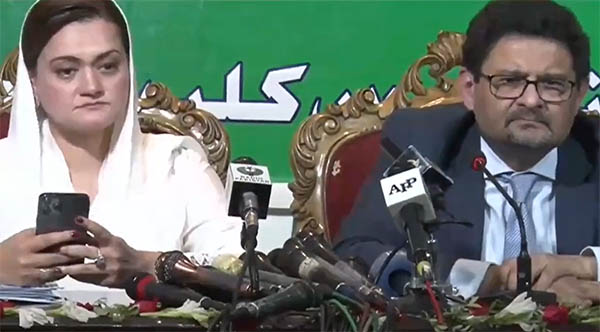
Screengrab of Information Minister Marriyum Aurangzeb and Finance Minister Miftah Ismail’s press conference
Prime Minister Shahbaz Sharif, in his inaugural address to the new federal cabinet on Wednesday, vowed that lawmakers of the ruling coalition will work together to resolve threats to the national economy, including unemployment and rising inflation.
Following the oath-taking of 30 federal ministers, three ministers of state, and three advisers on Tuesday, the inaugural meeting of the new federal cabinet was briefed on the country’s prevailing economic situation, energy crisis, and law and order. In a televised speech, Sharif congratulated the nation on the ouster of former prime minister Imran Khan and hailed the presence in his cabinet of “experienced” leaders who had rendered great sacrifices for Pakistan in the past.
“I want to thank the leadership [of all coalition parties] for giving you [cabinet] this responsibility,” he said, urging them to “work hard” to meet the expectations of the public. “We have to struggle with challenges like poverty, unemployment and inflation, as the previous government failed miserably in its fight against hardships,” he said, adding that the new government must take decisions in the best interest of the people of Pakistan.
The prime minister said the new government must not ignore the problems faced by the people of underdeveloped provinces like Balochistan and regretted that the former government was unduly criticizing the new regime’s performance already. Describing the Pakistan Tehreek-e-Insaf’s three-and-a-half years as the “most corrupt” government in the country’s history, he urged all lawmakers to counter its narrative, stressing that the new coalition would set aside its personal issues to serve the 220 million of Pakistan.
“I call this a war cabinet as we are fighting against inflation, unemployment and poverty, which we inherited from the previous government. The previous government had badly failed,” he said. “The only way to move forward is hard work, hard work and hard work,” he added.
Economic crisis
In a post-cabinet press briefing, Information Minister Marriyum Aurangzeb and Finance Minister Miftah Ismail reiterated that the ousted PTI regime had left the country’s economy in a precarious position. Confirming that he was leaving for the U.S. to attend meetings with the International Monetary Fund (IMF) and revive a suspended loan facility, Ismail hoped it would stabilize the rupee and reduce uncertainty in financial markets.
According to a cabinet briefing comparing economic indicators in 2017-18—the final year of the previous PMLN government—and 2021-22 under the PTI, GDP growth stood at 6.1 percent when the PTI came into power and had hit 4 percent when it was ousted. Similarly, it said consumer price index inflation had climbed from 3.9 percent to 10.8 percent; the sensitive price index had increased from 0.9 percent to 17.3 percent; food inflation had gone from 2.3 percent to 10.2 percent; and the fiscal deficit had increased from Rs. 2,260 billion in 2017-18 to Rs. 5,600 billion in 2021-22.
The briefing maintained that tax-to-GDP ratio had declined from 11.1 percent to 9.1 percent, while public debt had soared from Rs. 2,260 billion to Rs. 5,600 billion. “The PTI did not repay any loans,” said the finance minister, rebutting the former government’s claims of only taking fresh loans to repay old ones. “They kept rolling over loans while taking out new ones,” he alleged, adding more debt had been added by the PTI in three-and-a-half years than by any other government in Pakistan’s history.
According to the briefing, parts of which were made available to media, the number of unemployed Pakistanis has increased from 3.5 million in 2017-18 to 9.5 million in 2021-22. Similarly, it claimed, the number of people living below the poverty line had increased from 55 million to 75 million. The cabinet was also informed that the national exchequer had already borne losses of Rs. 67 billion due to the subsidy given by former prime minister Imran Khan on petrol and diesel during the months of April and May.
Contrary to ousted prime minister Imran Khan’s claims, said Ismail, Pakistan’s foreign exchange reserves currently stand at $10.8 billion—a minor bump over the $10 billion left by the PMLN government. The PTI had, last week, claimed it had left over $20 billion in reserves.
Stressing that the incumbent government would not adopt the previous regime’s policy of blaming its failures on past rulers, the finance minister said the new coalition government would work to overcome the challenges, as this was its responsibility to the people of Pakistan. “We will work with better management to bring down inflation and provide relief,” he said.
ECL committee
According to the information minister, the cabinet approved the formation of a four-member Exit Control List (ECL) committee, which would review the existing laws used to bar travel and suggest reforms to prevent political victimization and facilitate other victims of such curbs. “The committee has been tasked to submit a report on its findings to the cabinet within 3 days,” she added.
Earlier, Aurangzeb said the cabinet had also approved the reduction in prices of sugar and wheat flour during the month of Ramzan to facilitate the public. She said wheat prices in Punjab would be reduced from Rs. 550/10kg to Rs. 400, adding that sugar would be available for Rs. 70/kg at Utility Stores. She said the cabinet had issued directions to all provinces to ensure provision of sugar and flour across the country at notified rates.
